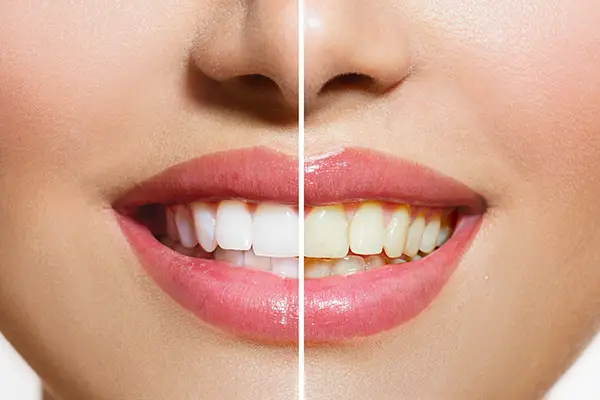Teeth Whitening for Sensitive Teeth – Gentle & Safe Options
 For those with sensitive teeth, whitening can feel like a painful trade-off between a brighter smile and persistent discomfort. If you’ve tried traditional whitening methods only to be met with sharp, nerve-triggered pain, you’re not alone. Teeth whitening for sensitive teeth is possible—it just requires the right products, techniques, and care. At Parkside Dental, we specialize in safe teeth whitening options that prioritize both comfort and results. For those with sensitive teeth, whitening can feel like a painful trade-off between a brighter smile and persistent discomfort. If you’ve tried traditional whitening methods only to be met with sharp, nerve-triggered pain, you’re not alone. Teeth whitening for sensitive teeth is possible—it just requires the right products, techniques, and care. At Parkside Dental, we specialize in safe teeth whitening options that prioritize both comfort and results.
Can You Whiten Teeth If You Have Sensitive Teeth?
The answer is yes—you can whiten sensitive teeth, but it must be done cautiously.
Conventional whitening treatments often contain high levels of hydrogen or carbamide peroxide. These ingredients can penetrate enamel and reach the dentin layer, where microscopic tubules lead directly to tooth nerves. For individuals with exposed dentin or worn enamel, this causes the familiar sting or ache associated with sensitivity.
Thankfully, specialized products exist. Enamel-safe whitening solutions use lower peroxide concentrations or none at all, reducing irritation. Others include built-in desensitizers like potassium nitrate or fluoride to protect nerves during treatment.
Before starting any whitening regimen, consult with our dental team at Parkside Dental. We'll assess your level of sensitivity and recommend the safest, most effective solution.
Causes of Tooth Sensitivity and Whitening Risks
Understanding the root causes of sensitivity can help explain why traditional whitening methods may hurt.
| • |
Worn Enamel - Thinner enamel makes it easier for whitening agents to reach the sensitive dentin.
|
| • |
Receding Gums - Gum recession can expose tooth roots, which are more sensitive to chemicals and temperature changes.
|
| • |
Cavities or Cracks - Openings in enamel or fillings allow whitening agents to irritate the pulp inside the tooth.
|
| • |
Dental Work - Sensitivity can follow recent procedures like fillings or crowns. |
Whitening works by increasing the permeability of enamel so stains can be broken down—but this also opens pathways to nerve endings. In some whitening kits, heat from LED lights can intensify this effect, making sensitivity worse.
Using harsh or frequent whitening treatments without guidance may transform short-term discomfort into long-term sensitivity. Opt for gentle teeth whitening protocols tailored to your oral health needs.
Best Teeth Whitening Options for Sensitive Teeth
There are effective, low-sensitivity whitening solutions available for both home use and professional application.
| • |
Over-the-Counter Options - Choose gentle whitening strips, low-peroxide gels, or natural whitening powders that are enamel-safe.
|
| • |
Dentist-Recommended Products - Some kits include desensitizing agents and are customized to your sensitivity level.
|
| • |
Peroxide-Free Kits - Ideal for those with extreme sensitivity, these use ingredients like PAP (phthalimidoperoxycaproic acid) instead of peroxide.
|
| • |
Custom Professional Trays - Available at Parkside Dental, these trays use prescription-strength formulas with built-in desensitizers for safer, more precise application. |
Key ingredients to look for include potassium nitrate, stannous fluoride, and carbamide peroxide in low concentrations. These compounds either block pain signals or strengthen enamel.
Whether you choose an at-home solution or an in-office treatment, prioritizing gentle teeth whitening methods will yield better results and fewer side effects.
Whitening Strips for Sensitive Teeth – Do They Work?
Yes, but only the right kind. Many people assume all whitening strips are the same, but that’s far from the truth—especially when you have sensitive teeth.
Look for whitening strips specifically labeled as “for sensitive teeth” or “enamel-safe.” These products are formulated with lower peroxide levels and often have shorter wear times to reduce irritation.
| • |
Choose Strips with Soothing Agents - Products containing potassium nitrate or aloe can help soothe nerves.
|
| • |
Follow Use Directions Strictly - Avoid overuse and never exceed the recommended application time.
|
| • |
Use with Desensitizing Toothpaste - Brushing before and after whitening with a sensitivity-friendly toothpaste adds protection.
|
| • |
Apply Post-Whitening Gels - These help seal enamel and block sensitivity after treatment. |
Not all whitening strips are created equal—opting for versions designed with sensitive users in mind makes a major difference.
Natural & Peroxide-Free Whitening Methods
If you’re wary of chemicals or have extreme sensitivity, natural whitening may seem appealing. While less potent, these methods can offer gradual improvement without harsh side effects.
| • |
Activated Charcoal - May absorb surface stains but can be abrasive—use with caution.
|
| • |
Baking Soda - Gentle polishing action, but excessive use can wear enamel.
|
| • |
Oil Pulling - Swishing coconut oil may promote oral health and reduce plaque but takes time to show results.
|
| • |
Peroxide-Free Whitening Pens - Many use PAP or sodium bicarbonate as safer alternatives. |
Natural doesn’t always mean safe—abrasive ingredients can still harm enamel if overused. For best results, combine gentle methods with lifestyle changes like avoiding coffee, wine, or smoking.
Discuss these options with our dental team to ensure you're not trading safety for false promises.
How to Prevent Sensitivity During and After Whitening
Managing sensitivity before, during, and after whitening is key to a pain-free experience.
| • |
Use Desensitizing Toothpaste - Brushing with products containing potassium nitrate or stannous fluoride can reduce nerve response.
|
| • |
Brush Gently - Use a soft-bristled brush and avoid over-brushing, especially after whitening.
|
| • |
Avoid Hot or Cold Foods - For at least 24 hours post-whitening, skip temperature extremes to prevent triggering pain.
|
| • |
Limit Whitening Frequency - Space out treatments and follow a professional’s advice on timing.
|
| • |
Rinse with Fluoride - Strengthens enamel and helps seal microscopic openings caused by whitening agents. |
Creating a care routine before and after treatment significantly reduces discomfort. A sensitivity-aware oral hygiene plan ensures long-term comfort and protection.
When to See a Dentist for Sensitive Teeth Whitening
If you’ve tried OTC whitening and experienced discomfort—or if your sensitivity is moderate to severe—professional guidance is essential.
Our dental team at Parkside Dental can provide a customized whitening solution that minimizes risk and maximizes results.
| • |
In-Office Whitening Treatments - Use carefully controlled ingredients and desensitizers.
|
| • |
Custom Whitening Trays - Tailored to your mouth for even application and less leakage onto gums.
|
| • |
Desensitizing Pretreatments - Applied prior to whitening to shield your nerves.
|
| • |
Oral Exam Before Whitening - Identifies hidden issues like cavities or exposed roots that could worsen sensitivity. |
Many patients also discover that their sensitivity is due to underlying conditions—not whitening agents. A thorough dental evaluation ensures whitening is done safely and effectively.
Schedule a Whitening Consultation
Every smile is different—and so is every case of sensitivity. At Parkside Dental, we offer customized professional teeth whitening for sensitive teeth to help you achieve a brighter smile without pain or risk.
Call (972) 442-7550 today to schedule a consultation and find the best whitening solution for your smile — safely and comfortably.
FAQs
Is it safe to whiten sensitive teeth?
Yes, when done with the right products and techniques. Specialized whitening options for sensitive teeth use lower peroxide levels or alternative ingredients to reduce discomfort and avoid nerve irritation.
What’s the best whitening method for people with high sensitivity?
Professional whitening using custom trays and desensitizing agents is often the most effective and safest choice. Peroxide-free options and natural methods can also be suitable for people with extreme sensitivity.
Can whitening make tooth sensitivity worse?
Yes, especially if done frequently or with high-peroxide products. However, using low-sensitivity methods and following a dentist’s recommendations can prevent symptoms from worsening.
Are natural whitening remedies better for sensitive teeth?
Natural remedies like baking soda or charcoal may seem safer, but they can still harm enamel if overused. It’s best to consult your dentist before starting any natural whitening routine. |

 For those with sensitive teeth, whitening can feel like a painful trade-off between a brighter smile and persistent discomfort. If you’ve tried
For those with sensitive teeth, whitening can feel like a painful trade-off between a brighter smile and persistent discomfort. If you’ve tried